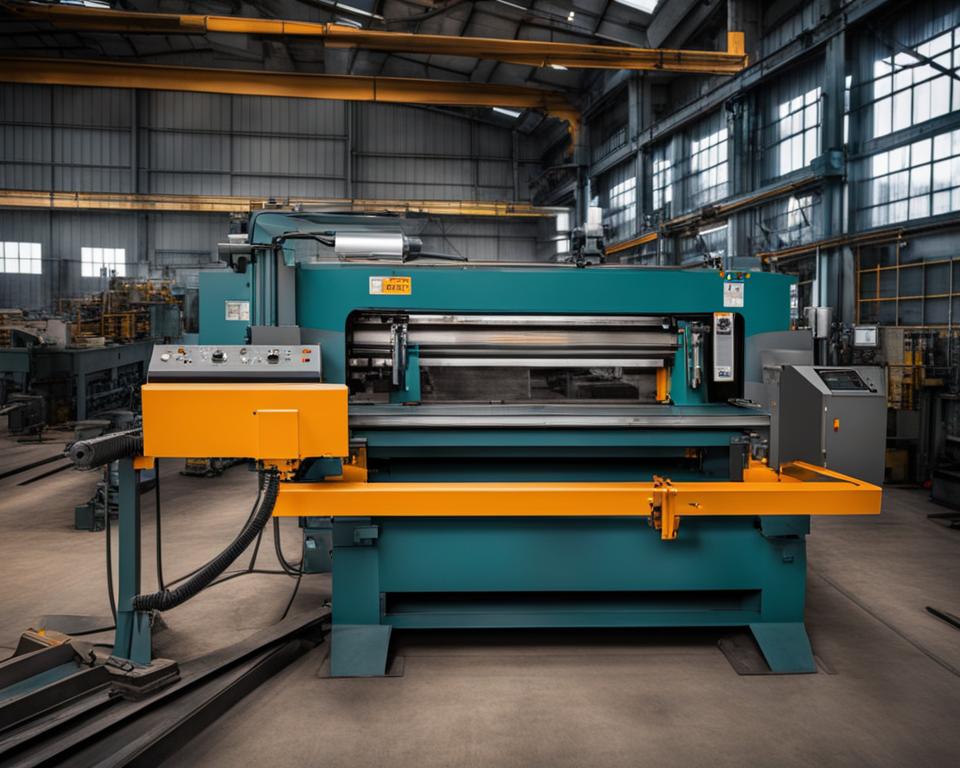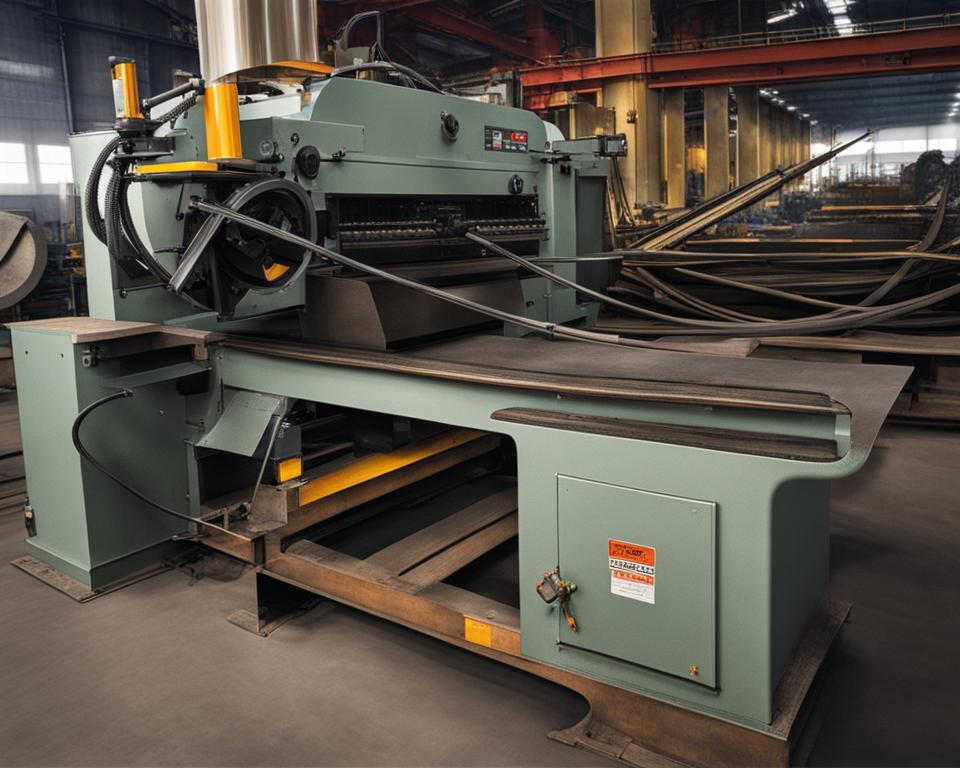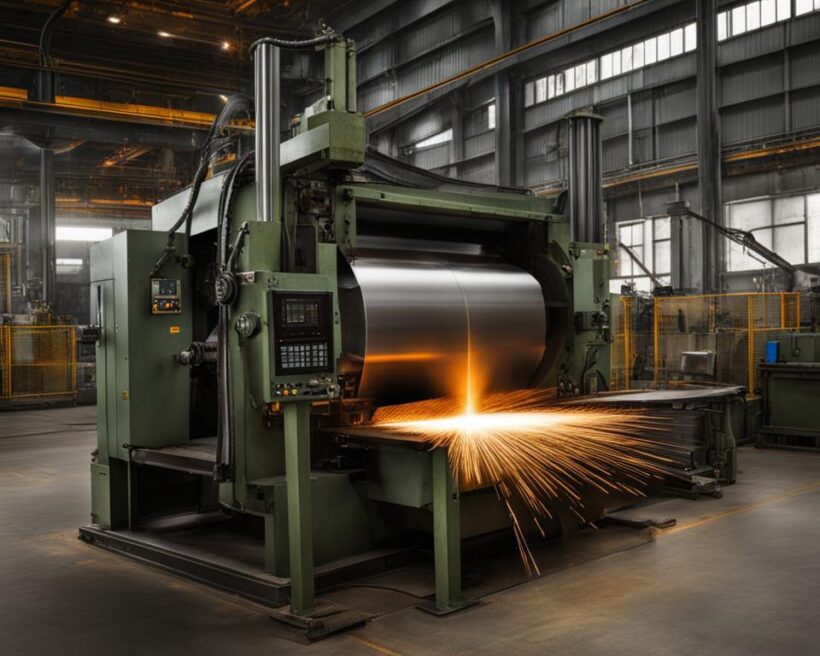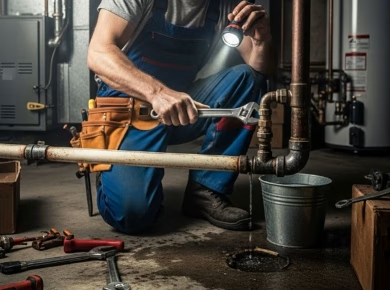Welcome to my comprehensive Bar Bending Machine Buying Guide. If you are in the market for a new or used bar bending machine, this guide will provide you with all the information you need to make an informed decision.
When it comes to purchasing a bar bending machine, there are several factors to consider. The type of machine, size and capacity, brand and quality, additional features and accessories, condition, age, brand and model, reputation of the seller, and price all play a role in determining the right machine for your needs.
In this guide, I will walk you through each of these factors, providing detailed insights and tips along the way. Whether you are a construction professional, metal fabricator, or involved in any industry that requires bar bending, this guide will help you choose the perfect machine.
So, let’s dive in and explore the world of bar bending machines together. By the end, you will have the knowledge and confidence to make the right choice for your construction needs.
Types of Bar Bending Machines
When it comes to bar bending machines, there are three main types to choose from: manual rebar benders, electric rebar benders, and hydraulic rebar benders. Each type offers its own unique features and advantages, catering to different project requirements and user preferences.
Manual Rebar Bender
A manual rebar bender is the most affordable option available. As the name suggests, it requires manual force to bend rebars. This type of bender is suitable for smaller projects or occasional use where precision bending is not a top priority. Although manual rebar benders require physical effort, they are easy to operate and lightweight, making them a portable choice for on-site bending tasks.
Electric Rebar Bender
Electric rebar benders, on the other hand, offer automated bending capabilities. Powered by electricity, these machines are more efficient and require less physical effort compared to manual benders. With the ability to bend rebars accurately and quickly, electric rebar benders are a popular choice for medium-sized projects that require consistent and precise bends. They offer options for programmable settings, allowing users to achieve repeatable bends with ease.
Hydraulic Rebar Bender
For heavy-duty or industrial applications, hydraulic rebar benders provide superior performance and durability. These machines utilize hydraulic power to bend rebars, offering high bending capacity and the ability to handle thicker rebars. Although hydraulic rebar benders come at a higher price point, they deliver efficient and accurate bending results, making them the go-to choice for demanding projects.

By understanding the different types of bar bending machines and their features, you can choose the one that best suits your specific needs and requirements. Whether it’s a manual rebar bender for smaller tasks, an electric rebar bender for medium-sized projects, or a hydraulic rebar bender for heavy-duty applications, investing in the right machine will contribute to the success and efficiency of your bending operations.
Factors to Consider When Buying a Used Bar Bending Machine
When purchasing a used rebar bending machine, there are several important factors to consider. These factors can help ensure that you make a wise investment and choose a machine that meets your requirements. Here are the key considerations:
- Condition: The condition of the machine is crucial. A machine in poor condition may require frequent repairs and maintenance, costing you time and money. It can also pose a safety risk to workers. Inspect the machine thoroughly before making a purchase to ensure it is in good working order.
- Age: While older machines may be more prone to wear and tear, a well-maintained older machine can still be reliable and efficient. Consider the age of the machine and assess its maintenance history to gauge its longevity.
- Brand and Model: The brand and model of the machine can greatly impact its durability and performance. Research reputable brands and check if spare parts and services are readily available for the chosen model.
- Reputation of the Seller: It is important to buy from a reputable seller to ensure a smooth transaction and professional service. Check the seller’s reputation by reading reviews and ratings from other buyers.
- Price: Balance the price of the machine with its quality. Avoid investing too much in a machine that may require high maintenance or deliver subpar results. Compare prices from different sellers to get the best deal.
Considering these factors will help you make an informed decision when buying a used rebar bending machine. Take your time to research and evaluate different options before making a final purchase.
Case Study: A Comparison of Used Rebar Bending Machines
Let’s compare two used rebar bending machines to illustrate how different factors can affect their suitability and cost:
| Machine | Condition | Age | Brand and Model | Reputation of the Seller | Price |
|---|---|---|---|---|---|
| Machine A | Good | 5 years | Brand X, Model Y | Positive reviews | $5,000 |
| Machine B | Fair | 10 years | Brand Z, Model W | Mixed reviews | $3,500 |
In this case, Machine A is in better condition, has a newer age, and is from a reputable brand with positive reviews. However, it comes with a higher price tag of $5,000. On the other hand, Machine B is in fair condition, older, and from a brand with mixed reviews. It is priced at $3,500.
Based on this comparison, Machine A may be the better choice if you prioritize reliability and quality, and have a higher budget. However, if budget is a concern and you are willing to accept some compromises, Machine B could be a viable option.

Applications and Bending Capacity of Bar Bending Machines
Bar bending machines are versatile tools used in a wide range of industries for various applications. These machines play a crucial role in construction, metal fabrication, automotive, aerospace, industrial machinery, and even in the production of household items. With their ability to bend flat bars, these machines are essential for reinforcing concrete structures, fabricating metal furniture, manufacturing chassis and body components for vehicles, and even constructing aircraft frames.
When it comes to bending capacity, different models of bar bending machines offer varying capabilities. The bending capacity is determined by factors such as the minimum inside diameter and specifications of each machine. This means that certain machines can handle thicker rebars and are better suited for heavy-duty or industrial applications, while others are more suitable for smaller projects or occasional use.
Understanding the applications and bending capacity of bar bending machines is crucial for selecting the right machine for your specific needs. Whether you’re working on a large construction project or need to bend metal for a customized piece of furniture, choosing a machine with the appropriate bending capacity will ensure efficient and accurate results.
| Industry | Applications |
|---|---|
| Construction | Bending flat bars for reinforcing concrete structures |
| Metal Fabrication | Fabricating metal furniture, chassis, and body components |
| Automotive | Manufacturing vehicle chassis and body components |
| Aerospace | Constructing aircraft frames and components |
| Industrial Machinery | Producing various metal components for machinery |
| Household Items | Creating customized metal items such as furniture |

Table: Applications of Bar Bending Machines in Different Industries
As seen in the table above, bar bending machines find their utility across multiple industries. Their applications range from reinforcing concrete structures in the construction industry to manufacturing various metal components for industrial machinery. This highlights the versatility and importance of these machines in different sectors.
When choosing a bar bending machine, it is important to consider the specific requirements of your project and the bending capacity needed. This ensures that you select a machine that can handle the job efficiently and provides the desired results. Knowing the applications and bending capacity of these machines allows you to make an informed decision and choose the right bar bending machine for your needs.
Conclusion
After considering the various factors involved in purchasing a bar bending machine, I can confidently guide you in making an informed decision. When exploring your options, take into account the type of machine, size and capacity, brand and quality, additional features and accessories, condition, age, brand and model, reputation of the seller, and price.
Remember, each type of bar bending machine has its own advantages and is suitable for different applications. Whether you opt for a manual rebar bender, an electric rebar bender, or a hydraulic rebar bender, carefully assess your specific project requirements to ensure you choose the right machine for your needs.
Throughout various industries, bar bending machines play a crucial role in tasks such as reinforcing concrete structures, metal fabrication, automotive manufacturing, aerospace applications, and more. To achieve the desired results, take note of the bending capacity of the machine you select, as this determines the thickness of rebars it can handle.
By following this comprehensive buying guide, you can confidently invest in a bar bending machine that aligns with your construction needs. Take your time to evaluate the options available, and make a decision that will not only meet your current project requirements but also provide long-term value and efficiency.
FAQ
What factors can influence the cost of a rebar bender?
The cost of a rebar bender can be influenced by factors such as the type of rebar bender (manual, electric, hydraulic), size and capacity, brand and quality, and additional features and accessories.
What are the different types of bar bending machines?
There are three main types of bar bending machines: manual rebar benders, electric rebar benders, and hydraulic rebar benders.
What are the advantages of each type of bar bending machine?
Manual rebar benders are the most affordable option and require manual force to bend rebars. Electric rebar benders are powered by electricity and offer automated bending capabilities. Hydraulic rebar benders utilize hydraulic power to bend rebars and offer high bending capacity for heavy-duty applications.
What should I consider when buying a used bar bending machine?
When buying a used bar bending machine, factors such as the condition, age, brand and model, reputation of the seller, and price should be considered.
What are the applications and bending capacity of bar bending machines?
Bar bending machines have various applications across different industries and come with different bending capacities. They are used to bend flat bars for reinforcing concrete structures, fabrication of metal furniture, chassis and body components, aircraft frames, and more.
How can I choose the right bar bending machine for my construction needs?
By considering factors such as the type of machine, size and capacity, brand and quality, additional features and accessories, condition, age, brand and model, reputation of the seller, and price, you can make an informed decision and choose the right bar bending machine.








